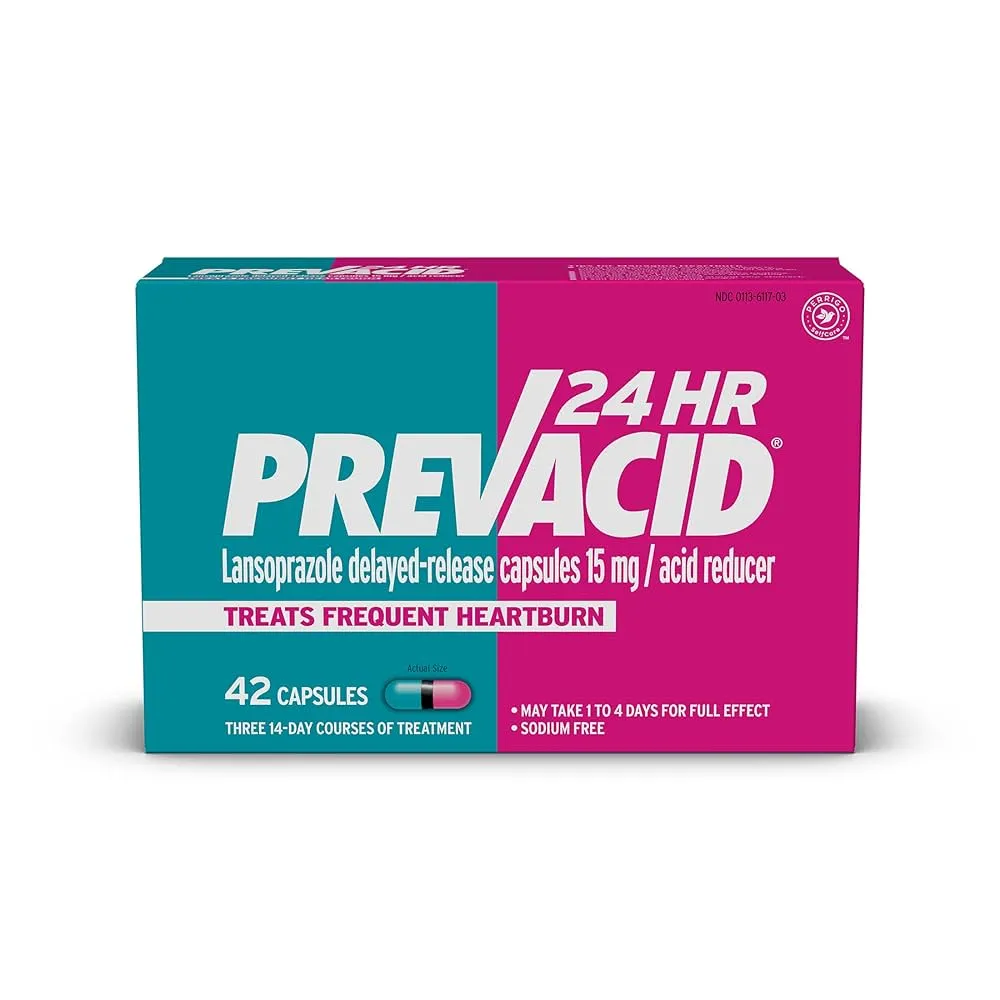Comprehensive Guide to Lansoprazole: Uses, Dosage, Side Effects, and More
What is Lansoprazole?
Overview of Lansoprazole
Generic Name: Lansoprazole
Brand Name: Prevacid, generics
Drug Group: Proton pump inhibitor (anti-ulcer, gastroprotective)
Commonly Used For
- Treat gastroesophageal reflux disease (GERD).
- Heal duodenal ulcers.
- Eradicate Helicobacter pylori infection.
Key Characteristics
Form: Delayed-release capsules (15 mg, 30 mg), orally disintegrating tablets (15 mg, 30 mg), or granules for oral suspension (detailed in Dosage section).
Mechanism: Blocks the final step of acid secretion, raising gastric pH.
Approval: FDA-approved (1995 for Prevacid) and EMA-approved for acid-related conditions.

Indications and Uses of Lansoprazole
Lansoprazole is indicated for a variety of gastrointestinal and related conditions, leveraging its potent acid-suppressive effects:
Gastroesophageal Reflux Disease (GERD): Alleviates heartburn, regurgitation, and esophagitis, per gastroenterology guidelines, supported by clinical trials showing 80% symptom relief within 4 weeks.
Duodenal Ulcer: Heals ulcers caused by H. pylori or NSAID use, reducing pain and bleeding risk, recommended in ulcer management protocols.
Gastric Ulcer: Treats benign gastric ulcers, promoting mucosal healing, with evidence of reduced relapse rates.
Helicobacter pylori Eradication: Used in combination with antibiotics (e.g., amoxicillin, clarithromycin) to eradicate H. pylori, preventing recurrence, per infectious disease studies.
Zollinger-Ellison Syndrome: Manages hypersecretory conditions, controlling acid hypersecretion, with endocrinology data.
Erosive Esophagitis: Heals severe esophageal damage from acid reflux, with esophageal pathology evidence.
NSAID-Associated Ulcers: Prevents and treats ulcers in chronic NSAID users, with rheumatology-gastroenterology research.
Laryngopharyngeal Reflux (LPR): Investigated off-label to reduce throat symptoms, with otolaryngology studies.
Functional Dyspepsia: Explored off-label to alleviate non-ulcer dyspepsia, with gastroenterology evidence.
Prevention of Stress Ulcers: Used off-label in critically ill patients, with intensive care medicine data.
Dosage of Lansoprazole
Dosage for Adults
GERD: 15 mg once daily for 4–8 weeks; maintenance: 15 mg daily if needed.
Duodenal Ulcer: 15 mg once daily for 4 weeks; severe cases: 30 mg daily.
Gastric Ulcer: 30 mg once daily for 4–8 weeks.
H. pylori Eradication: 30 mg twice daily for 10–14 days, combined with clarithromycin 500 mg and amoxicillin 1 g (or metronidazole 500 mg if penicillin-allergic).
Zollinger-Ellison Syndrome: Initial: 60 mg once daily, adjusted up to 90–180 mg/day (divided doses) based on acid output.
Dosage for Children (≥1 year)
GERD or Erosive Esophagitis:
- 1–11 years: 15 mg once daily (≤30 kg) or 30 mg once daily (>30 kg) for up to 12 weeks, under pediatric gastroenterology supervision.
- ≥12 years: 15–30 mg once daily for 8 weeks.
Dosage for Pregnant Women
Pregnancy Category B: Use only if benefits outweigh risks; consult an obstetrician, with fetal monitoring.
Dosage Adjustments
Renal Impairment: No adjustment needed; monitor in severe cases (CrCl <30 mL/min).
Hepatic Impairment: Mild to moderate (Child-Pugh A or B): 15 mg daily; severe (Child-Pugh C): Avoid or use 15 mg every other day.
Concomitant Medications: Adjust if combined with CYP2C19 inhibitors (e.g., fluconazole), increasing levels; monitor.
Elderly: No specific adjustment; assess for long-term risks (e.g., fractures).
Additional Considerations
- Take this active ingredient before meals, preferably in the morning, for optimal effect.
- Swallow capsules whole or mix granules with apple juice/applesauce for oral suspension; do not crush or chew.
How to Use Lansoprazole
Administration:
Oral Capsules: Swallow whole with water 30 minutes before a meal.
Orally Disintegrating Tablets: Place on tongue, allow to dissolve, and swallow with or without water.
Nasogastric Tube: Mix granules with 40 mL apple juice, flush tube before and after.
Timing: Take once daily, ideally before breakfast, or twice daily as prescribed.
Monitoring: Watch for abdominal pain, severe diarrhea, or signs of low magnesium (e.g., muscle cramps); report changes immediately.
Additional Tips:
- Store at 15–30°C (59–86°F), protecting from moisture and light.
- Keep out of reach of children; discard unused suspension after 30 minutes.
- Avoid antacids within 1 hour of dosing to prevent interference.
- Schedule regular follow-ups every 4–6 weeks during long-term use to monitor magnesium levels and bone health.
- Educate patients on dietary triggers (e.g., spicy foods) to complement therapy.
Contraindications for Lansoprazole
Hypersensitivity: Patients with a known allergy to Lansoprazole, other PPIs, or substituted benzimidazoles.
Severe Hepatic Impairment: Contraindicated in Child-Pugh Class C due to reduced metabolism.
Concurrent Use with Rilpivirine: Avoid due to reduced efficacy of HIV medication.
Gastric Malignancy: Contraindicated until malignancy is ruled out, as symptoms may mask cancer.
Hypersensitivity to Components: Avoid in patients allergic to excipients (e.g., gelatin in capsules).
Warnings & Precautions for Lansoprazole
General Warnings
Clostridioides difficile Infection: Risk of severe diarrhea with prolonged use; monitor for fever or bloody stools.
Hypomagnesemia: Risk with >1 year of use; check magnesium levels every 6 months.
Bone Fractures: Increased risk of osteoporosis-related fractures with long-term use; assess bone density.
Vitamin B12 Deficiency: Risk with >3 years of use; monitor B12 levels annually.
Acute Interstitial Nephritis: Rare kidney inflammation; assess renal function if symptoms arise.
Additional Warnings
Cutaneous Lupus Erythematosus: Risk of subacute CLE; discontinue if rash or joint pain occurs.
Gastric Neuroendocrine Tumors: Rare risk with prolonged hypergastrinemia; monitor with endoscopy.
Liver Dysfunction: Elevated liver enzymes; check hepatic function in at-risk patients.
Hypersensitivity Reactions: Rare anaphylaxis or angioedema; stop if severe.
Fundic Gland Polyps: Increased risk with >1 year of use; monitor with upper GI evaluation.
Use in Specific Populations
Pregnancy: Category B; use with caution, monitoring fetal outcomes.
Breastfeeding: Use caution; monitor infant for gastrointestinal effects.
Elderly: Higher risk of fractures and hypomagnesemia; monitor closely.
Children: Safe for short-term use with pediatric oversight.
Renal/Hepatic Impairment: Adjust or avoid in severe cases.
Additional Precautions
- Inform your doctor about liver disease, osteoporosis, or long-term medication use before starting this medication.
- Avoid abrupt discontinuation to prevent rebound acid hypersecretion.
Overdose and Management of Lansoprazole
Overdose Symptoms
- Nausea, abdominal pain, or diarrhea.
- Severe cases: Confusion, drowsiness, or blurred vision.
- Tachycardia, hypotension, or seizures as early signs.
- Rare coma or profound electrolyte imbalance with extremely high doses.
Immediate Actions
Contact the Medical Team: Seek immediate medical help if overdose is suspected.
Supportive Care: Administer activated charcoal if ingestion is recent, monitor vital signs, and correct electrolytes.
Specific Treatment: No specific antidote; manage symptoms (e.g., IV fluids for hypotension).
Monitor: Check magnesium, B12, and liver function for 24–48 hours.
Patient Education: Advise against self-adjusting doses and to store safely.
Additional Notes
- Overdose risk is low with therapeutic use; store securely and limit access.
- Report persistent symptoms (e.g., severe confusion, rapid heartbeat) promptly.
Side Effects of Lansoprazole
Common Side Effects
- Nausea (5–10%, managed with food timing)
- Diarrhea (3–8%, controlled with hydration)
- Abdominal Pain (2–6%, decreases with time)
- Headache (2–5%, relieved with rest)
- Constipation (1–4%, managed with fiber)
These effects may subside with adaptation.
Serious Side Effects
Seek immediate medical attention for:
- Gastrointestinal: C. difficile infection or severe diarrhea.
- Metabolic: Hypomagnesemia, hypocalcemia, or B12 deficiency.
- Musculoskeletal: Osteoporotic fractures or muscle weakness.
- Renal: Acute interstitial nephritis or renal failure.
- Allergic: Rash, angioedema, or anaphylaxis.
Additional Notes
- Regular monitoring with magnesium and B12 levels every 6–12 months is advised for long-term use (>1 year).
- Patients with a history of kidney disease should have renal function assessed every 3 months.
- Report any unusual symptoms (e.g., muscle cramps, yellowing skin) immediately to a healthcare provider.
- Long-term use (>3 years) requires bone density scans and gastrointestinal evaluation to detect polyps or tumors.
Drug Interactions with Lansoprazole
This active ingredient may interact with:
- Clopidogrel: Reduces antiplatelet effect; use cautiously.
- Warfarin: Increases bleeding risk; monitor INR.
- Methotrexate: Raises levels; monitor with high doses.
- Iron Supplements: Reduces absorption; separate by 2 hours.
- CYP2C19 Inducers: Lowers levels (e.g., rifampin); adjust dose.
Action: Provide your healthcare provider with a complete list of medications.
Patient Education or Lifestyle
Medication Adherence: Take this PPI as prescribed for acid reflux or ulcers, following the pre-meal schedule.
Monitoring: Report diarrhea, muscle cramps, or signs of infection immediately.
Lifestyle: Avoid trigger foods (e.g., caffeine, spicy meals); elevate head during sleep.
Diet: Take before meals; limit alcohol to reduce irritation.
Emergency Awareness: Know signs of severe infection or magnesium deficiency; seek care if present.
Follow-Up: Schedule regular check-ups every 3–6 months to monitor long-term effects.
Pharmacokinetics of Lansoprazole
Absorption: Oral, peak at 1.7 hours; bioavailability ~80%.
Distribution: Volume of distribution ~0.4 L/kg; 97% protein-bound.
Metabolism: Hepatic via CYP2C19 and CYP3A4 to inactive metabolites.
Excretion: Primarily renal (14–23% unchanged); half-life 1–2 hours.
Half-Life: 1–2 hours, with prolonged effect due to irreversible enzyme inhibition.
Pharmacodynamics of Lansoprazole
This drug exerts its effects by:
- Irreversibly inhibiting H+/K+-ATPase, reducing gastric acid secretion by 80–95%.
- Healing erosive esophagitis and ulcers over 4–8 weeks of therapy.
- Exhibiting dose-dependent risks of hypomagnesemia and infections.
Storage
Temperature: Store at 15–30°C (59–86°F); protect from moisture and light.
Protection: Keep in original container, away from heat and humidity.
Safety: Store in a secure location out of reach of children and pets.
Disposal: Dispose of unused tablets or suspension per local regulations or consult a pharmacist.
Frequently Asked Questions (FAQs)
Q: What does Lansoprazole treat?
A: This medication treats acid reflux and ulcers.
Q: Can this active ingredient cause diarrhea?
A: Yes, diarrhea is possible; report if severe.
Q: Is Lansoprazole safe for children?
A: Yes, for short-term use with supervision.
Q: How is this drug taken?
A: Orally before meals, as directed.
Q: How long is Lansoprazole treatment?
A: Typically 4–8 weeks, or longer as prescribed.
Q: Can I use Lansoprazole if pregnant?
A: Yes, with caution; consult a doctor.
Regulatory Information
This medication is approved by:
U.S. Food and Drug Administration (FDA): Approved in 1995 (Prevacid) for GERD and ulcers.
European Medicines Agency (EMA): Approved for acid-related disorders and H. pylori.
Other Agencies: Approved globally for gastrointestinal therapy; consult local guidelines.
References
- U.S. Food and Drug Administration (FDA). (2023). Prevacid (Lansoprazole) Prescribing Information.
- Official FDA documentation detailing the drug’s approved uses, dosage, and safety.
- European Medicines Agency (EMA). (2023). Lansoprazole Summary of Product Characteristics.
- EMA’s comprehensive information on the medication’s indications and precautions in Europe.
- National Institutes of Health (NIH). (2023). Lansoprazole: MedlinePlus Drug Information.
- NIH resource providing detailed information on the drug’s uses, side effects, and precautions.
- World Health Organization (WHO). (2023). WHO Model List of Essential Medicines: Lansoprazole.
- WHO’s inclusion of Lansoprazole for gastrointestinal conditions.
- American Journal of Gastroenterology. (2022). Lansoprazole in GERD.
- Peer-reviewed article on Lansoprazole efficacy (note: access may require a subscription).
